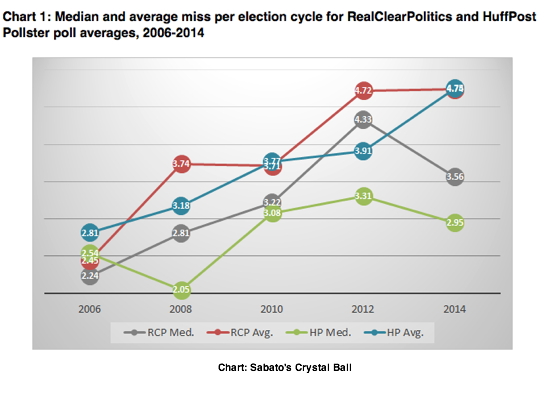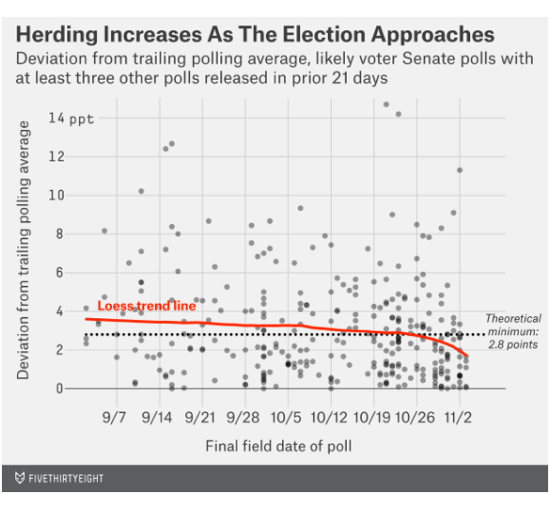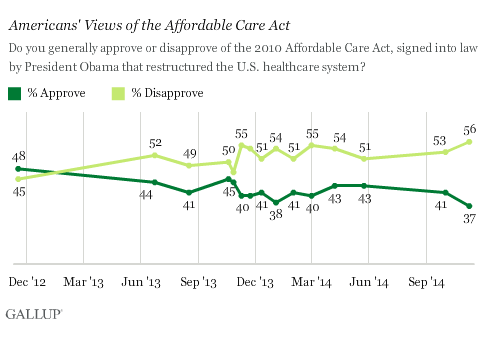
Post election discussions and analysis turn to polling accuracy. We summarize several different perspectives. And Gallup takes the measure of the ACA as enrollment opens again. This is HuffPollster for Monday, November 17, 2014.
'THE GOP'S NUMBERS PROBLEM' - Steven Shepard on grumbling among some Republicans that their internal numbers missed again: "For two years, Republicans had been working to correct one of the party’s greatest embarrassments of recent years: the flawed polling that led so many in the party to believe Mitt Romney was on the cusp of victory in 2012. But after dramatically underestimating Democratic turnout in 2012, it was now obvious that the GOP had erred in the other direction in 2014. Their pollsters had understated Republicans’ leads in a number of states, causing the RNC and GOP campaign committees to pour money into places where it wasn’t needed and hold money back from places where it might have made a difference — such as Virginia, where Republican Ed Gillespie lost by less than a percentage point. 'It’s just as bad to be wrong by being too conservative,' said [Republican National Committee Chief of Staff Mike] Shields. 'It’s just as big a mistake to tell a client that you’re only winning by one point when they’re winning by eight. Especially at the party committee level, there are just too many decisions being made … That money can be used elsewhere.' Republicans, it turned out, weren’t the only ones with polling problems: The Democratic internals and public polls also overestimated the Democratic turnout. But the GOP, in particular, had spent months refining its methods just to avoid this problem." [Politico]
-Brendan Nyhan: "Not sure I understand this piece - sounds like GOP polls missed in same places everyone did like KY & VA... Not like ‘12" [@BrendanNyhan]
Rothenberg asks about 'hot' polls for GOP - Forecaster Stu Rothenberg, at a Gallup post-election forum on Thursday: “It’s all about the weighting. The problem is, from my point of view, that there’s just so much weighting going on…it’s all about the weighting, it’s all about the modeling, it’s all about the assumptions of turnout. And for me, I don’t think we know what the turnout’s going to be. I said to one Republican media consultant, ‘how many polls did you guys do in this race?’ And he gave me a number. And I said, ‘well why didn’t you just look at ‘em unweighted and see if you were getting indications that one side was dramatically more motivated than the other before you started weighting?’And he said, ‘well, maybe…we had all these different polls and they were all coming back hot for the Republicans, they were all coming back hot.’ Maybe there is more enthusiasm on the Republican side and maybe the models and weighting should reflect that.”
Republican pollster McInturff responds' - McInturff, also speaking at Gallup, offered a response to a similar line of criticism: "We’re getting to the point where, essentially, if you want to predict an election, it’s trying to figure out the party composition, because there are no more swing voters. They’re gone....What it means is...the only thing that matters are two questions: What’s the composition, are you a Republican or a Democrat, and by what margin are independents voting for one party or another and does that make a difference?...But I will just tell you as a pollster…you might think things are ‘hot’ [in the final week] but you better be very careful. If your numbers tell you that it’s minus two Democrat and [you] say, ‘I know what’s going to happen,’ you start getting into la-la land in terms of guessing wrong. And by the way, we do look at unweighted numbers every day and they are directional, but you’re a lot better off as a pollster putting out your numbers and saying ‘yea, I think it’s a Democrat electorate plus two, we’re up one or two,’ then trying to outguess numbers. because in the long run, outguessing numbers is a terrifying way to make a living”
PUBLIC POLLING WAS WORSE ON AVERAGE- Kyle Kondik and Geoffrey Skelley offer 14 "quick takes" on the election results including this: "The polls really were worse than usual. This cycle featured the largest average miss by the two major poll aggregators, RealClearPolitics and HuffPost Pollster, in recent competitive Senate races. This isn’t a slight toward them — after all, they simply use the data that’s available, and it seems the data may be getting worse. While the median miss has been somewhat up and down, the average has increased relatively consistently cycle-to-cycle. Why? Prior to this cycle, neither average had missed a race by double-digits, but this time at least one average missed the Arkansas, Kansas, and Virginia races by at least 10 points. Below you’ll find the median and average miss per election cycle from 2006-2014 for both major poll averages." [Sabato's Crystal Ball]
SILVER: EVIDENCE OF 'HERDING' - Nate Silver: "It’s not the inaccuracy of the polling average that should bother you — Iowa was one of many states where the polls overestimated how well Democrats would do — so much as the consensus around such a wrong result. This consensus very likely reflects herding. In this case, pollsters herded toward the wrong number....As the election season wore on, new polls hewed somewhat more closely to the polling averages. But the change was marginal until the final week or two of the campaign, when they started to track it much more closely. By the eve of the election, new polls came within about 1.7 percentage points of the polling average. Perhaps you could construct some rationale, apart from herding, for why the polls behaved this way. Maybe it became easier to predict who was going to vote and that made methodological differences between polling firms matter less. As a more technical matter, the volume of polling increased as the election approached...But there are two dead giveaways that herding happened. One is the unusual shape of the curve. Rather than abiding by a linear progression, it suddenly veers toward zero in the final week or so of the campaign. What happened during this period? It’s when pollsters were releasing their final polls of the campaign — the ones they think posterity will judge them by. These polls were included in the final Real Clear Politics averages and received a heavy weight in the final FiveThirtyEight forecast. The impolite way to put it is that this was CYA (cover-your-ass) time for pollsters. Some that had produced 'outlier' results before suddenly fell in line with the consensus." [538]
DEMS LOST BUT THEIR TURNOUT EFFORTS 'LOOK SUCCESSFUL' - Nate Cohn: Democrats lost but did their effort to "mobilize the young and nonwhite voters who do not usually participate in midterm elections" succeed in targeted states? "The preliminary and qualified answer is that the Democratic field effort was probably a success. An analysis of precinct and county-level returns, supported by exit polls and limited voter file data, suggests that the turnout in key Senate battlegrounds was generally more favorable for Democrats than it was in 2010. When it wasn’t, the Democratic turnout still seemed impressive when compared with the states where they did not make significant investments, like Virginia or Maryland. The evidence for a fairly successful Democratic turnout effort is straightforward. Whether judged by county or by precinct where available, turnout tended to increase most over 2010 levels in Democratic-leaning counties in core battleground states. The drop-off in Democratic counties and precincts compared with 2012 — a presidential year, when turnout is higher — was generally more modest in the Senate battlegrounds than elsewhere. This judgment is preliminary because it does not yet reflect the best available data on voter turnout: the voter files, which allow us to see who voted and who stayed home. Turnout in counties or precincts is an imperfect proxy for changes in partisan turnout, even when the data is fairly clear." [NYT]
GALLUP MEASURES THE ACA AS ENROLLMENT OPENS AGAIN - Justin McCarthy: As the Affordable Care Act's second open enrollment period begins, 37% of Americans say they approve of the law, one percentage point below the previous low in January. Fifty-six percent disapprove, the high in disapproval by one point. Americans were slightly more positive than negative about the law around the time of the 2012 election, but they have consistently been more likely to disapprove than approve of the law in all surveys that have been conducted since then.” [Gallup]
Newly insured give coverage good marks - Frank Newport: “Over seven in 10 Americans who bought new health insurance policies through the government exchanges earlier this year rate the quality of their healthcare and their healthcare coverage as "excellent" or "good." These positive evaluations are generally similar to the reviews that all insured Americans give to their health insurance. Among those who bought new health insurance policies through the exchanges, the majority are about as satisfied with their coverage and healthcare as are other Americans -- suggesting that the end result of the exchange enrollment process is a generally positive one for those who take advantage of it.” [Gallup]
More than half of uninsured plan to get coverage - Jeffrey Jones: More than half of uninsured Americans say they plan to sign up for health coverage, a promising sign as the open enrollment period for obtaining health insurance through state and federal exchanges opens. Specifically, 55% of Americans who currently lack insurance say they plan to sign up for coverage while 35% of the uninsured say they will not get insurance and instead pay the fine as required by the Affordable Care Act, also known as ‘Obamacare.’..Most uninsured Americans, 70%, say they are aware of the requirement to have health insurance or pay a fine, the "individual mandate" provision of the 2010 healthcare law that the Supreme Court upheld in a 2012 ruling. However, that leaves nearly 30% who were not aware they must have insurance or pay a fine...Uninsured Americans' familiarity with the exchanges is low, with 46% saying they are "not familiar at all" with the exchanges, and another 19% claiming they are ‘not too familiar’ with the exchanges. Eight percent say they are ‘very familiar’ and 22% are ‘somewhat familiar.’” [Gallup]
SUPPORT FOR NET NEUTRALITY DEPENDS ON FRAMING OF THE QUESTION - HuffPollster: “Americans across the political spectrum agree on some of the basic concepts of net neutrality, but their ideas about government regulation to enforce it are considerably more mixed -- perhaps understandably, since most still haven't even heard of it….Fifty-five percent of Americans, including two-thirds of those who'd heard about net neutrality, said they'd oppose allowing Internet service providers to strike deals in which some companies pay to have their online content load faster than other content. In a rare showing for American politics, there wasn't much of a divide along partisan lines: 57 percent of Democrats, 51 percent of independents and 59 percent of Republicans were opposed….In the HuffPost/YouGov poll, the spirit of bipartisanship largely vanishes as soon as the focus moves from Internet service providers' power to the actual government regulation that could curtail it. Just 34 percent of Americans support government regulations to achieve net neutrality, with 28 percent opposed and 38 percent unsure. Democrats were more than twice as likely to support regulation as to oppose it, while Republicans were twice as likely to oppose it as to support it.” [HuffPost]
HUFFPOLLSTER VIA EMAIL! - You can receive this daily update every weekday morning via email! Just click here, enter your email address, and and click "sign up." That's all there is to it (and you can unsubscribe anytime).
MONDAY’S 'OUTLIERS' - Links to the best of news at the intersection of polling, politics and political data:
-Glen Bolger (R) contrasts five straight "wave" elections with the calm of the mid 90s and early 00s. [CrystalBall]
-Wendy Davis' campaign was bad, says Harry Enten, but that probably didn't matter. [538]
-Karthick Ramakrishnan looks at what 2014 does and doesn’t say about Asian Americans’ voting. [WashPost]
-Tom Bonier moves from Clarity Labs to CEO of Democratic data firm Target Smart Communications. [Politico]
-Brent Benson covers a HuffPollster talk on the midterm results. [Commonwealth]
-Jeanne Zaino asks if we can trust the polls in 2016. [HuffPost]
-Esther Inglis-Arkell explains how to use dice to stop people from lying on surveys. [io9 via @LoveStats]



